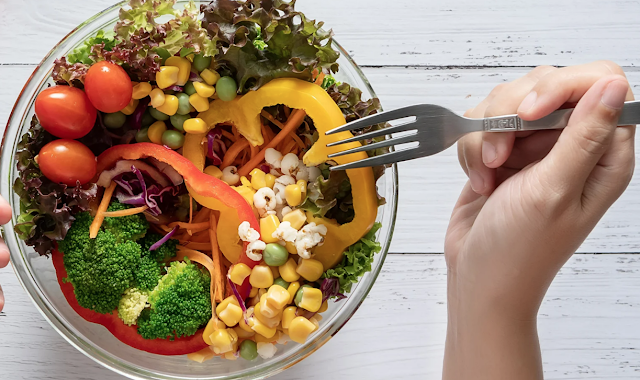Advice on how to improve your eating habits
The fact that 66 percent of the population has expanding waistlines makes it very clear that maintaining a healthy eating plan is difficult for a lot of people. If you are having trouble keeping the resolve that you made at the beginning of the year, here are some easy recommendations that can help you get started on a path toward new and healthier eating behaviors.
Every calorie counts. It's not a choice between low carb and low fat. You can consume fewer calories by eating less food, which is why it is possible to lose weight on any diet that eliminates whole categories of foods or limits portion sizes. Nevertheless, you run the risk of being hungry and regaining the weight if you do this. When compared to protein and carbs, fat contains 9 calories per gram, while carbohydrates and protein each only have 4 calories per gram. This indicates that consuming less fat will result in a lower calorie intake even if you maintain your current level of food consumption. Eat fewer simple carbs and less fat in your diet. If you want to lose one pound in one week, you need to reduce the amount of calories you consume in a typical week by 3,500 calories. In order to do this, cut your typical daily calorie intake by 200 to 300 calories per day and aim to burn an extra 200 to 300 calories per day via increased physical activity.

Don't diet. Try replacing the phrase "I can't have that because I am on a diet" with "I don't want it because I am altering my eating habits."
Keep a food diary for a month or at the very least a few weeks to keep track of what you eat, when you eat it, and why you eat it. This will help you take responsibility for what you eat and how much of it you consume. If you want to know when your body is telling you to eat because of hunger as opposed to mental or external cues, paying attention to the physical cues and signals it sends you may help you discover this. Is asking yourself, "Am I genuinely hungry, or am I eating because... it is there, it smells delicious, I don't want to waste food, I'm stressed out, I'm bored (insert your favorite reason here)?"
Do not limit the things you eat! There are no "bad" foods; the problem is always with eating too much of them. If you don't get enough of particular food groups, you'll start to want them and wind up overeating as a result. You also miss out on essential nutrients.
In order to get familiar with serving sizes and portion amounts, weigh and measure food for at least a month, but at the absolute least, for two weeks. The majority of people have absolutely no idea what a single serving genuinely looks like since, over the years, serving sizes and quantities have become so distorted at restaurants and other establishments that are similar to restaurants. The majority of restaurants provide portions that are two to three times the size of a single meal.
Don't miss meals. Eating regularly (between five and six times a day) not only revs up your metabolism but also helps maintain a healthy blood sugar level and prevents you from overeating.
Be positive. Recognize when your thoughts are irrational.Put your attention on the things that you have successfully accomplished and the good alterations that you have brought about. Keep in mind that success begets more success.
If you want to improve your health, one of the best ways to do it is to lose weight in a method that doesn't hurt it. Even while smoking cigarettes or using similar products might help you lose weight, doing so in such a manner is not healthy, and you will quickly return to your former eating and exercise routines (and weight).
Steer clear of trans fats and fats that have been partially hydrogenated ("bad fats"). They could extend the shelf life of some food products, but the people whose bodies they put in danger by eating them have shorter lifespans as a result.
Reduce your consumption of "bad carbohydrates" such as sugar and white wheat. They are low in fiber, so if you are attempting to build good eating habits, they are a double whammy for you: a lot of calories that don't make you feel full, and low fiber content.
Increase your consumption of "healthy carbohydrates" such as fruits, vegetables, lentils, and grains that have not been refined (such as whole-wheat flour and brown rice). They have a high fiber content, which sluggishes absorption and makes you feel full before you consume an excessive amount of calories.
What you include in your diet is just as important as what you exclude. The majority of these preventive antioxidants and compounds that are beneficial to one's health can be found in healthy carbohydrates, such as fruits, vegetables, whole grains, and legumes, with very few exceptions.
Consume fewer servings of red meat. It's possible that Dr. Atkins had a different opinion, but there's a lot of artery-clogging saturated fat in it, and it's also been linked to an increased risk of cancer.
Begin by making minor modifications to your diet. If you want to reduce your cholesterol level or your weight even more (or if you already have heart disease and want to reverse it), you may need to make some more significant lifestyle adjustments. C
Pick quality over quantity every time. If you pay attention to what you're eating, you'll find that eating lesser amounts of healthier meals will leave you feeling more satisfied than eating larger quantities of less healthy items.
Post a Comment